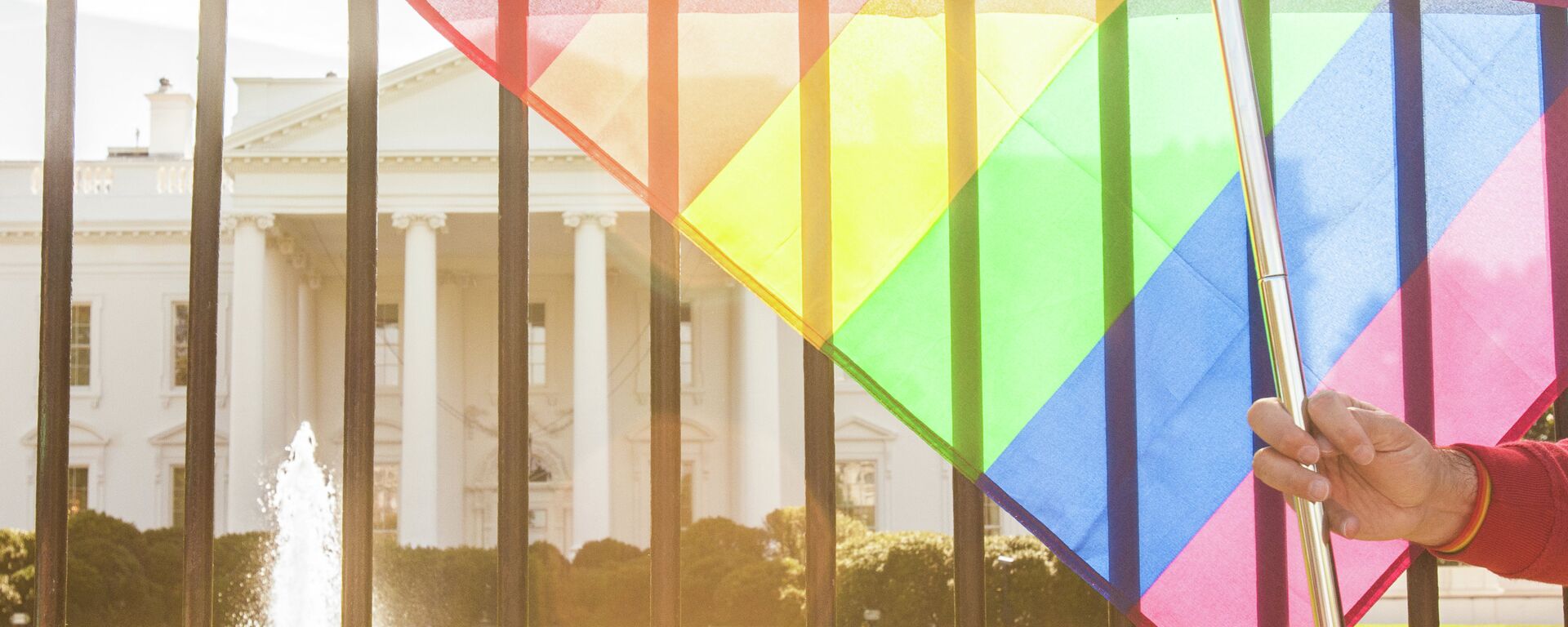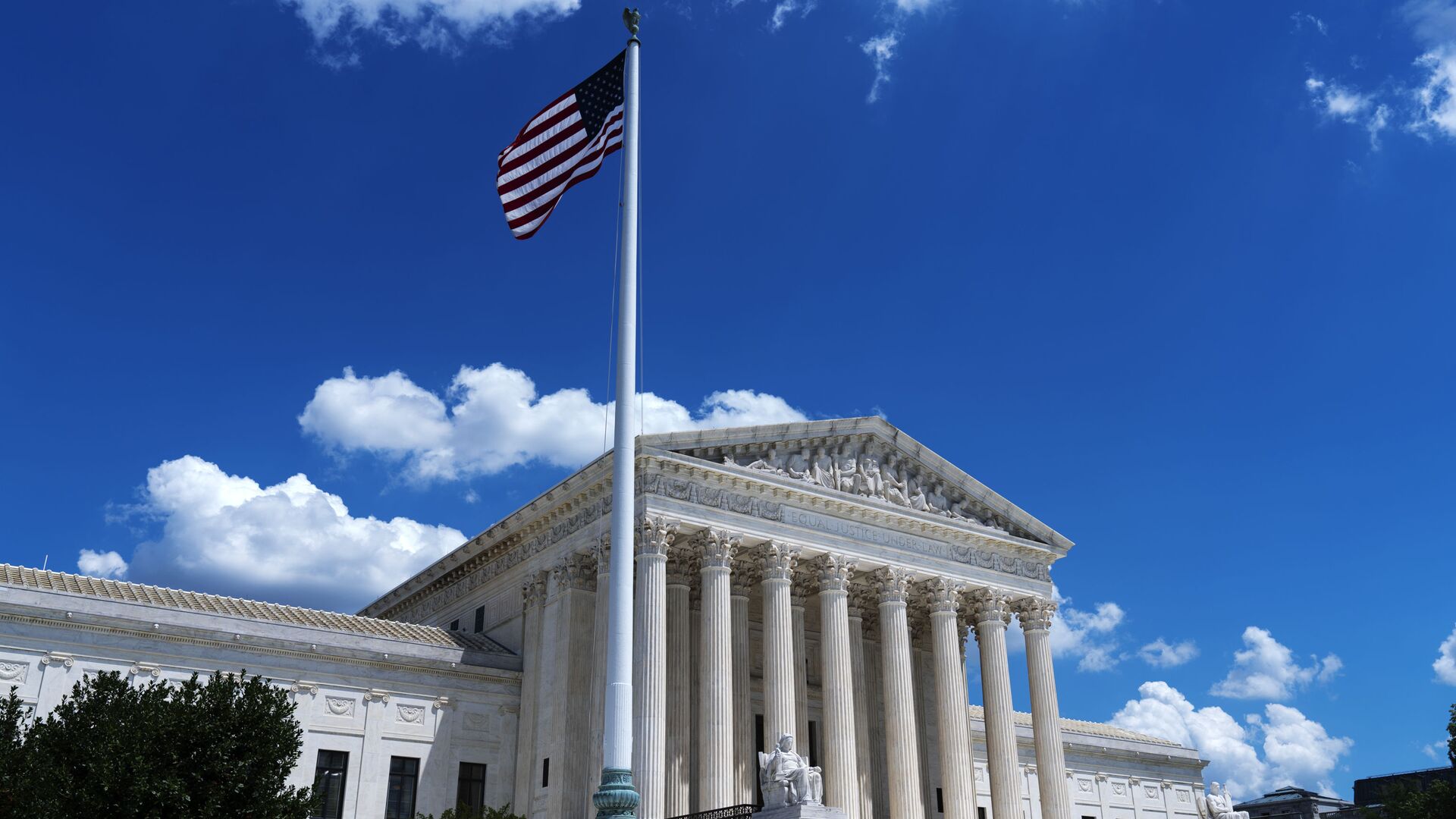https://sputnikglobe.com/20230630/supreme-court-strikes-down-lgbtq-discrimination-protections-student-loan-relief-program-1111589513.html
Supreme Court Strikes Down LGBTQ Discrimination Protections, Student Loan Relief Program
Supreme Court Strikes Down LGBTQ Discrimination Protections, Student Loan Relief Program
Sputnik International
The US Supreme Court issued a stinging blow to two parts of US President Joe Biden’s agenda on Friday: discrimination protections for LGBTQ people and student loan relief.
2023-06-30T20:39+0000
2023-06-30T20:39+0000
2023-06-30T20:37+0000
americas
us supreme court
lgbtq
student loans
biden administration
https://cdn1.img.sputnikglobe.com/img/07e5/07/01/1083285915_0:160:3073:1888_1920x0_80_0_0_872bd27a8e4fc0a8e18bf2681975de75.jpg
The US Supreme Court issued a stinging blow to two parts of US President Joe Biden’s agenda on Friday: discrimination protections for LGBTQ people and student loan relief. Both rulings were divided along ideological lines, with the three liberal justices dissenting from the six-justice conservative majority.Student Loan Relief Plan RejectedIn one case, Biden v. Nebraska, the high court found Congress had not authorized the White House to forgive student loans using executive action when it passed a law in 2003 allowing the Department of Education to waive or forgive student financial aid for reasons related to war or other military operation or a national emergency.“We hold today that the Act allows the Secretary to ‘waive or modify’ existing statutory or regulatory provisions applicable to financial assistance programs under the Education Act, not to rewrite that statute from the ground up,” he continued.Last August, Biden used his executive authority to implement a plan for canceling up to $10,000 in student loan debt for borrowers with incomes below a certain level, and up to $20,000 for those who received Pell Grants. However, the order was immediately challenged in the courts.Earlier this month, Biden vetoed a bill passed by Congress that would also have repealed the student loan relief plan. In both houses of Congress, several Democrats crossed the aisle to vote with their Republican colleagues.Biden Denounces Conservative 'Hypocrisy’Speaking to the press on Friday afternoon, Biden noted student loan relief would continue under other programs implemented by his administration, which have helped more than 600,000 borrowers.He noted 16 million people had already been approved for the program the court struck down, which he described as “snatching from their hands” a program that was about to “change their lives.”“I believe the court’s decision … was a mistake, was wrong. I’m not going to stop fighting to get borrowers what they need, particularly those at the bottom of the socioeconomic scale.”He announced a new program he said was consistent with the court’s ruling and was grounded in the Higher Education Act to allow the Secretary of Education to forgive some loans.Biden also announced an “on-ramp” program that would allow borrowers who miss payments a 12-month grace period before they are penalized for delinquency.Citing Republican “hypocrisy,” he noted that many of those who strongly supported the $760 billion Paycheck Protection Program (PPP) opposed the student loan relief program, even though they both address financial crises created by the COVID-19 pandemic and the student loan program was projected to cost a little more than half that of the PPP.A Blow for LGBTQ RightsIn another ruling, its final of the term, the high court found that religious objection was a legal reason for a business to refuse service to a member of the LGBTQ community, despite a state law prohibiting such discrimination.In the case 303 Creative LLC v. Elenis, six of the nine justices sided with a wedding website designer who wanted to be able to refuse to make web pages for weddings of same-sex couples, based on her belief as a Christian that same-sex relationships are immoral. Colorado law forbade such a practice, so she challenged the law in court.“Colorado seeks to force an individual to speak in ways that align with its views but defy her conscience about a matter of major significance,” wrote Justice Neil Gorsuch in the majority opinion, adding that those opposed to same-sex marriage were entitled to “tolerance” as well.In a stunning 11th-hour revelation, a US magazine reported earlier this week that much of the case was built on deception.According to The New Republic on Thursday, when its reporters contacted the man who it was claimed in the lawsuit had attempted to contract 303 Creative, LLC for a wedding web page for him and his husband-to-be, they found the man had never contacted the company for such a service. In fact, not only was the man heterosexual instead of gay, but was already married to a woman at the time the proposal was allegedly made, in 2018.The ruling comes amid hundreds of bills in state legislatures and the US Congress this year that have aimed to roll back the rights of LGBTQ people, in particular, transgender Americans. The right-wing advocacy group that has helped write and promote many of those bills, the Alliance Defending Freedom, is also the group that argued 303 Creative v. Elenis before the high court.
https://sputnikglobe.com/20230629/supreme-court-strikes-down-race-based-admissions-policies-at-us-universities-1111558400.html
https://sputnikglobe.com/20230609/supreme-court-strikes-down-alabama-voting-map-that-threatened-to-disenfranchise-black-voters-1111019636.html
https://sputnikglobe.com/20220901/equality-is-not-within-reach-un-human-rights-expert-blasts-us-record-on-lgbtq-rights-1100287687.html
americas
Sputnik International
feedback@sputniknews.com
+74956456601
MIA „Rossiya Segodnya“
2023
News
en_EN
Sputnik International
feedback@sputniknews.com
+74956456601
MIA „Rossiya Segodnya“
Sputnik International
feedback@sputniknews.com
+74956456601
MIA „Rossiya Segodnya“
lgbtq rights; student loans; supreme court; ruling; biden
lgbtq rights; student loans; supreme court; ruling; biden
Supreme Court Strikes Down LGBTQ Discrimination Protections, Student Loan Relief Program
With the appointment of several sharply conservative Supreme Court justices by then-US President Donald Trump and a series of political reversals by the court, many in the US began to see the high court as having deviated from its non-partisanship. However, progressives pointed out the court's rulings have always been highly political.
The US Supreme Court issued a stinging blow to two parts of US President Joe Biden’s agenda on Friday: discrimination protections for LGBTQ people and student loan relief. Both rulings were divided along ideological lines, with the three liberal justices dissenting from the six-justice conservative majority.
Student Loan Relief Plan Rejected
In one case, Biden v. Nebraska, the high court found Congress had not authorized the White House to forgive student loans using executive action when it passed a law in 2003 allowing the Department of Education to waive or forgive student financial aid for reasons related to war or other military operation or a national emergency.
“The Secretary asserts that the HEROES Act grants him the authority to cancel $430 billion of student loan principal. It does not,” wrote Chief Justice John Roberts in the majority opinion, representing himself and the five other conservative justices.
“We hold today that the Act allows the Secretary to ‘waive or modify’ existing statutory or regulatory provisions applicable to financial assistance programs under the Education Act, not to rewrite that statute from the ground up,” he continued.
Last August, Biden used his executive authority to implement a plan for canceling up to $10,000 in student loan debt for borrowers with incomes below a certain level, and up to $20,000 for those who received Pell Grants. However, the order was immediately challenged in the courts.
More than 40 million Americans hold student loan debt, with 43% of debtors being over the age of 40. Altogether, Americans hold some $1.6 trillion in student loan debt.
The Congressional Budget Office has estimated Biden’s plan could eliminate $400 billion of that debt.
Earlier this month, Biden vetoed
a bill passed by Congress that would also have repealed the student loan relief plan. In both houses of Congress, several Democrats crossed the aisle to vote with their Republican colleagues.
Biden Denounces Conservative 'Hypocrisy’
Speaking to the press on Friday afternoon, Biden noted student loan relief would continue under other programs implemented by his administration, which have helped more than 600,000 borrowers.
He noted 16 million people had already been approved for the program the court struck down, which he described as “snatching from their hands” a program that was about to “change their lives.”
“I think the court misinterpreted the Constitution,” Biden told a reporter on Friday who asked if he had overstepped his authority with the executive order.
“I believe the court’s decision … was a mistake, was wrong. I’m not going to stop fighting to get borrowers what they need, particularly those at the bottom of the socioeconomic scale.”
He announced a new program he said was consistent with the court’s ruling and was grounded in the Higher Education Act to allow the Secretary of Education to forgive some loans.
Biden also announced an “on-ramp” program that would allow borrowers who miss payments a 12-month grace period before they are penalized for delinquency.
Citing Republican “hypocrisy,” he noted that many of those who strongly supported the $760 billion Paycheck Protection Program (PPP) opposed the student loan relief program, even though they both address financial crises created by the COVID-19 pandemic and the student loan program was projected to cost a little more than half that of the PPP.
In another ruling, its final of the term, the high court found that religious objection was a legal reason for a business to refuse service to a member of the LGBTQ community, despite a state law prohibiting such discrimination.
In the case 303 Creative LLC v. Elenis, six of the nine justices sided with a wedding website designer who wanted to be able to refuse to make web pages for weddings of same-sex couples, based on her belief as a Christian that same-sex relationships are immoral. Colorado law forbade such a practice, so she challenged the law in court.
“Colorado seeks to force an individual to speak in ways that align with its views but defy her conscience about a matter of major significance,” wrote Justice Neil Gorsuch in the majority opinion, adding that those opposed to same-sex marriage were entitled to “tolerance” as well.

1 September 2022, 23:14 GMT
“The opportunity to think for ourselves and to express those thoughts freely is among our most cherished liberties and part of what keeps our Republic strong,” he continued. “Of course, abiding the Constitution’s commitment to the freedom of speech means all of us will encounter ideas we consider ‘unattractive,’ ‘misguided, or even hurtful.’ But tolerance, not coercion, is our Nation’s answer.”
In a stunning 11th-hour revelation, a US magazine reported earlier this week that much of the case was built on deception.
According to
The New Republic on Thursday, when its reporters contacted the man who it was claimed in the lawsuit had attempted to contract 303 Creative, LLC for a wedding web page for him and his husband-to-be, they found the man had never contacted the company for such a service. In fact, not only was the man heterosexual instead of gay, but was already married to a woman at the time the proposal was allegedly made, in 2018.
The ruling comes amid hundreds of bills in state legislatures and the US Congress this year that have aimed to roll back the rights of LGBTQ people, in particular, transgender Americans. The right-wing advocacy group that has helped write and promote many of those bills, the Alliance Defending Freedom, is also the group that argued 303 Creative v. Elenis before the high court.





